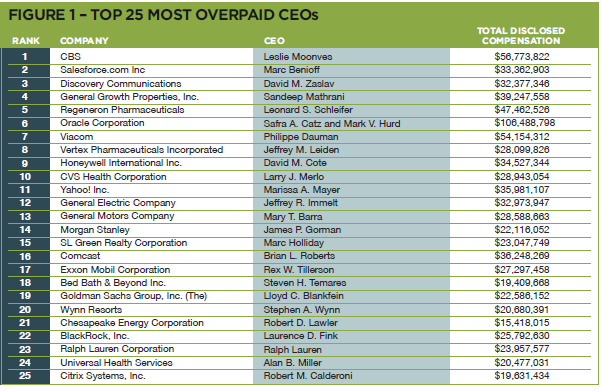From the Harvard Law School Forum on Corporate Governance and Financial Regulation:
According to the Economic Policy Institute,“CEO pay grew an astounding 943% over the past 37 years, greatly outpacing the growth in the cost of living, the productivity of the economy, and the stock market, disproving the claim that the growth in CEO pay reflects the ‘performance’ of the company, the value of its stock, or the ability of the CEO to do anything but disproportionately raise the amount of his pay.”For the past two years, we have highlighted the 100 most overpaid CEOs of S&P 500 companies, and the votes of large shareholders, including mutual funds and pension funds on their pay packages.
What has changed since the first report? Not much. Executive pay has continued to increase. Although mutual funds and pension funds are doing better at exercising their fiduciary responsibility by more frequently voting their proxies against some of the most outrageous CEO pay packages. Of the mutual funds with the largest changes in voting habits from last year, all of them opposed more of the pay packages than they had the prior year.
As we noted in our prior reports, the system in place to govern corporations has failed in the area of executive compensation. Like all the best governance systems, corporate governance relies on a balance of power. That system envisions directors representing shareholders and guarding the company’s assets from waste. It also envisions shareholders holding companies and executives accountable.
This governance system comes from a time when it was assumed that unhappy investors would simply sell their stakes if sufficiently dissatisfied with the governance of a company. It reflects a time when there were fewer intermediaries between beneficial holders and corporate executives. However, today more and more investors own shares through mutual funds, often investing in S&P 500 index funds. Individual investors are not in a position to sell their stakes in a specific company. The funds themselves are subject to a number of conflicts of interest and to what economists refer to with the oxymoronic-sounding term “rational apathy,” to reflect the expense of oversight in comparison to a pro rata share of any benefits.
Today, those casting the votes on the behalf of shareholders frequently do not represent the shareholders’ interests.
CEO compensation as it is currently structured does not work; rather than incentivize sustainable company growth, compensation plans increase disproportionately by every measure. Too often CEOs are rewarded for mergers and acquisitions instead of improving company performance. As noted in the Financial Crisis Inquiry Report, “Those [compensation] systems encouraged the big bet—where the payoff on the upside could be huge and the downside [for the individual executive] limited. This was the case up and down the line—from the corporate boardroom to the mortgage broker on the street.”2 We note that the downside, which could include such features as environmental costs, may be limited for the individual, and instead borne by the larger society.
Paying one individual excessive amounts of money can lead people to make the false assumption that such compensation is justified and earned. It undermines essential premises of capitalism: the robust ‘invisible hand’ of the market as well as the confidence of those who entrust capital to third parties. Confusing disclosure coupled with inappropriate comparisons are then used to justify similar packages elsewhere. These systems perpetuate and exaggerate the destabilizing effects of income inequality, and may contribute to the stagnating pay of frontline employees.
As the report is now in its third year, we have the ability to look back and see what happened to the companies identified in our report two years ago. We’ve been saying the most overpaid CEOs under-deliver for shareholders. In examining this data from the following two years of our report, we have found dramatic results—not only does the group of 100 most overpaid CEO companies of the S&P 500 underperform the S&P 500 by 2.9 percentage points, but the firms with the 10 most overpaid CEOs underperformed the S&P 500 index by an amazing 10.5 percentage points and actually had a negative return, reducing the actual value of the companies’ shares by 5.7 percent. In summary, the firms with the most overpaid CEO’s devastated shareholder value since our first report published in February 2015....MORE, including 50 page PDF: "The 100 Most Overpaid CEOs: Are Fund Managers Asleep at The Wheel?"
